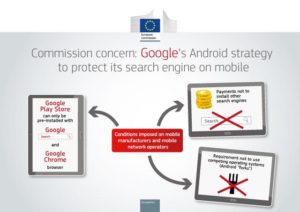EU Commission Hits Google With Abuse Of Dominance Charges Over Android

A View from Constantine Cannon’s London Office
By Richard Pike and Yulia Tosheva
Just as expected, following a one-year investigation and a number of information requests, the European Commission formally announced today that it is accusing Google’s parent company, Alphabet, of abusing its dominant position in relation to the Android mobile operating system.
Google is already facing antitrust charges from Brussels over promoting its own shopping service in online searches. The stakes seem higher for Google in the Android case, however, as it made about $11 billion last year from advertising sales on Android phones through its apps such as Maps, Search and Gmail, according to estimates by financial analyst Richard Windsor.[1] About 80% of smartphones and tablets globally run on Android.[2]

In today’s Statement of Objections, the Commission took the preliminary view that Google has violated the EU competition rules by:
• Requiring manufacturers to pre-install Google Search and Google’s Chrome browser as a condition to license certain Google proprietary apps;
• Preventing manufacturers from selling smart mobile devices running on competing operating systems based on the Android open source code; and
• Giving financial incentives to manufacturers and mobile network operators on condition that they exclusively pre-install Google Search on their devices.
The Commission alleges that Google holds market shares of more than 90% in the markets for general internet search services, licensable smart mobile operating systems and app stores for the Android mobile operating system. FairSearch, the lead complainant, said that “virtually every phone maker using Google Android in the European Union has bowed to Google’s demands, suppressing competition by other app makers and preventing free choice for consumers”[3]
Google has quickly rejected the charges insisting that Android is a “free and open-source operating system.” Kent Walker, the company’s Senior Vice President & General Counsel, said in a blog post that the company’s partner agreements are “entirely voluntary” and that “anyone can use Android without Google.” In fact, the Commission’s charges came out mere hours after a decision by Canada’s Competition Bureau yesterday to close its antitrust probe into Google due to lack of evidence.
It has been suggested that the Android case has some similarities with the EU’s epic Microsoft case, in which Microsoft was found guilty of tying its Windows Media Player with its Windows operating system. However, one key difference is how Microsoft and Google make profits from their operating systems. While Microsoft makes money by selling Windows itself, Google provides Android to smartphone manufacturers essentially for free, while hoping to make money from advertising and app downloads.[4] This means that for the Commission to succeed its arguments will need to be substantially different from those employed against Microsoft.
Google has 12 weeks in which to respond to the charges. It also has the option of requesting an oral hearing to present its views. The entire investigation is likely to last many more months. It will be interesting to see whether the EU regulator continues to believe it has sufficient evidence to prove its allegations and, if it makes an infringement decision, whether it is able to weather the inevitable appeals.
Critics that have accused the EU Competition Commissioner Margrethe Vestager of unfairly targeting U.S. companies such as Amazon and Google will see this as yet further proof of their point. The Commissioner, of course, has denied the accusations.
– Edited by Gary J. Malone
[1]http://uk.reuters.com/article/uk-eu-google-antitrust-idUKKCN0XH0VU
[2]http://www.idc.com/prodserv/smartphone-os-market-share.jsp
[3]http://www.telegraph.co.uk/business/2016/04/20/google-accused-of-abusing-android-smartphone-monopoly-in-new-bat/
[4] http://www.ft.com/cms/s/0/f1d7b3fc-06dd-11e6-a70d-4e39ac32c284.html#axzz46MaLuWDx
Tagged in: Antitrust Enforcement, International Competition Issues,